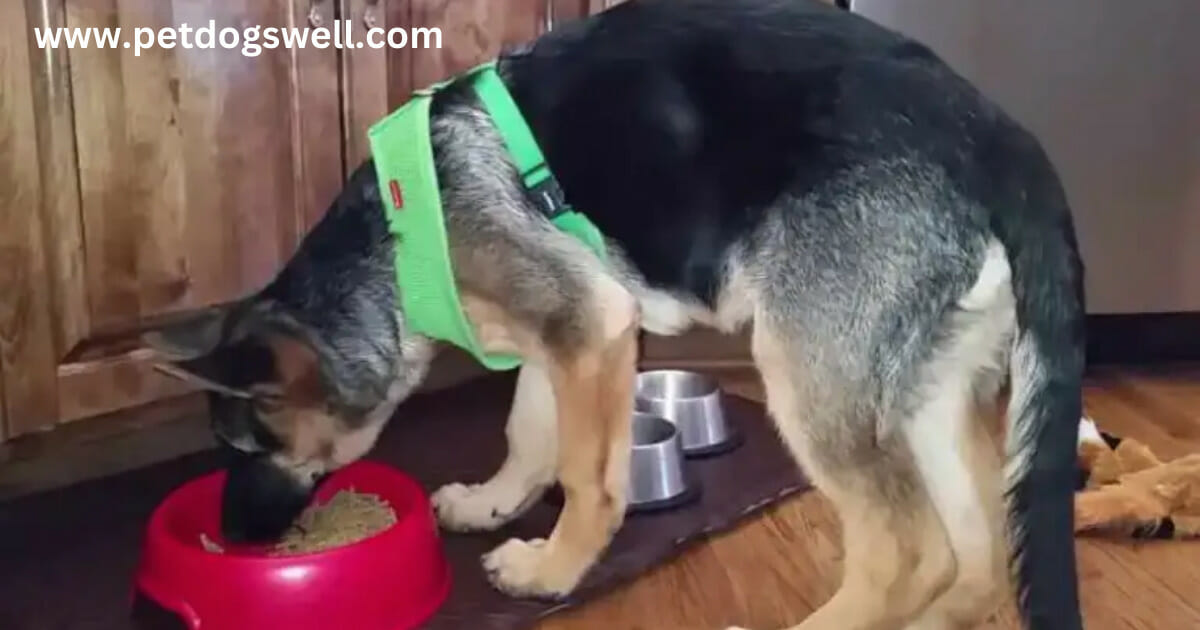German Shepherds are large size dogs and they also need more volume of food as compared to other small dog breeds like Australian Terriers, Chihuahua, and Italian Greyhounds. To understand the best dog food for German Shepherds, read this full guide article. It will help you a lot.
Understanding the German Shepherd’s Dietary Needs
German Shepherds are larger in size and energetic dogs. They are very active and perform many powerful activities like hunting, security and police dog and military dog services.
German Shepherds require a well-balanced mix of foods like proteins, carbohydrates, fats, vitamins, and minerals to maintain their overall health and muscle mass.
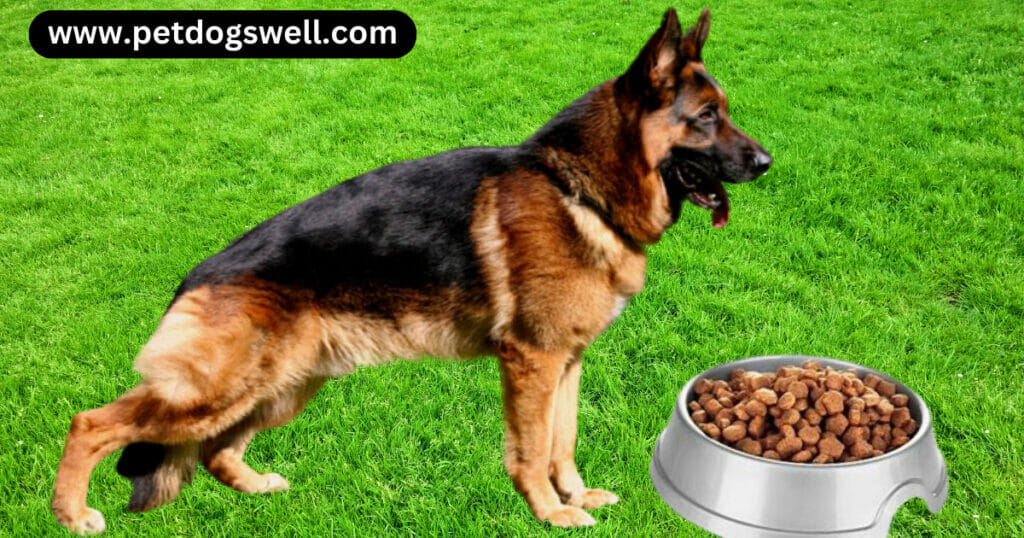
By considering their age, size and physical activity type you should feed your German Shepherd dog a supper best and healthy food. Below are essential tips and suggestions for the best dog food for German Shepherds to keep them healthy and well-satisfied dogs.
There are following given the best dog food for German Shepherds;
1. Protein as German Shepherds Food
As we know that German Shepherds perform high-energy activities, therefore they need more amount of protein to build their muscles and for maintaining their energy levels.
The protein requirement for adult German Shepherds is 20% – 25% in their daily diet. The major protein sources for German Shepherds food are chicken, eggs, beef, lamb, turkey, salmon, and fish. For example, wild-caught salmon is rich in protein and it can provide all the proteins your dog needs for building the muscles.
2. Carbohydrates as German Shepherds Food
When you provide healthy food to your German Shepherds, it is also important that you should add carbohydrates to that food. Carbohydrates provide around 3.5 to 4 Calories per gram to dogs and it is very important food for maintaining their energy needs.
Recommended:
The best and easy-to-digest carbohydrate sources for your German Shepherds are rice, oats, and barely. They provide enough energy and your dog remains active, energetic, and playful throughout the day.
The other carbohydrate sources are wheat, corn, and soy. They also provide good calories but they are harder to digest and their nutritional value is less as compared to rice, oats, and barely.
3. Fats as the Best Dog Food for German Shepherds
Fats are a rich and concentrated source of energy for dogs. Fats provide more than twice the amount (2.5 times) of energy per gram compared to proteins and carbohydrates.
Fats help proper cell functioning and provide internal support to the cells and regulate different body functions overall. Fats are very good for maintaining healthy dog skin and shiny coat. Some fats like omega-3 fatty acids are beneficial for reducing inflammation. They also provide energy to the brain and keep the brain healthy and active.
German Shepherd dogs require 10% – 15% of fats in their daily diet, and this helps to maintain their energy needs.
There are below health benefits of fats in German Shepherds’ food;
- Fats promote dogs’ joint health.
- Fats keep German Shepherd’s coats healthy and shiny.
- Fats regulate their nerves and muscles.
- Fats provide a complete structure to the body cells.
- Fats also regulate the whole cellular function.
- Fats manage the weight of German Shepherds.
- Fats add flavor and aroma to dog food.
Best Dog Food for German Shepherds with Sensitive Stomachs
If your German Shepherd dog has a sensitive stomach, then you should be very careful when feeding your dog food that may disturb the stomach of your dog.
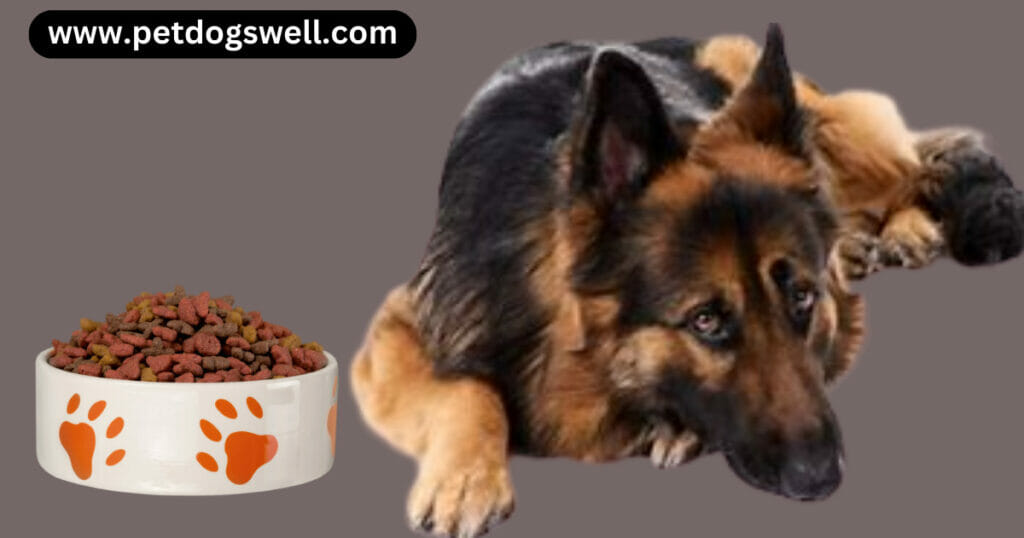
The best dog foods for German Shepherds that have sensitive stomachs are protein foods like chicken, lamb, and turkey. In this situation try to feed your German Shepherd dog healthy wet dog food that is good for the treatment of sensitive stomachs.
Additionally, feed your German Shepherd pure and 100% human-grade food that is very helpful to treat a sensitive stomach. This human-grade food improves the digestive health of your German Shepherd dog amazingly.
Best Food for German Shepherds with Allergies
German Shepherd dogs are most likely to suffer from food allergies especially when they are continuously fed with protein-rich food like chicken. There are many other animal protein foods that can cause food allergies in German Shepherds like eggs, beef, lamb, fish and milk.
Therefore, be careful about the food ingredients when feeding your dog such high-protein foods and treats. Make sure to arrange the best dog food for German Shepherds when they are suffering from food allergies.
If your German Shepherd dog suffers from food allergies from one protein source then try another protein so that the dog’s health should be maintained and the dog may be recovered from food allergies.
Best Dog Food for German Shepherds with Joint Problems
German Shepherd dogs have heavy-weight and healthy dogs, therefore they are more likely to suffer from joint problems in the form of hip or elbow dysplasia. These joint problems cause pain and swelling in dogs and cause much difficulty in walking.
Best Food for German Shepherds Suffering from Joint Problems;
Bone broth is very healthy and much beneficial for the health and recovery of the joints which are swollen from hip or elbow dysplasia both in humans and animals.
So, serve your German Shepherd dog bone broth as it improves the joint’s health and it strengthens the tendons and ligaments of the joints of your dog. It will provide too much health for your dog and help with easy walking.
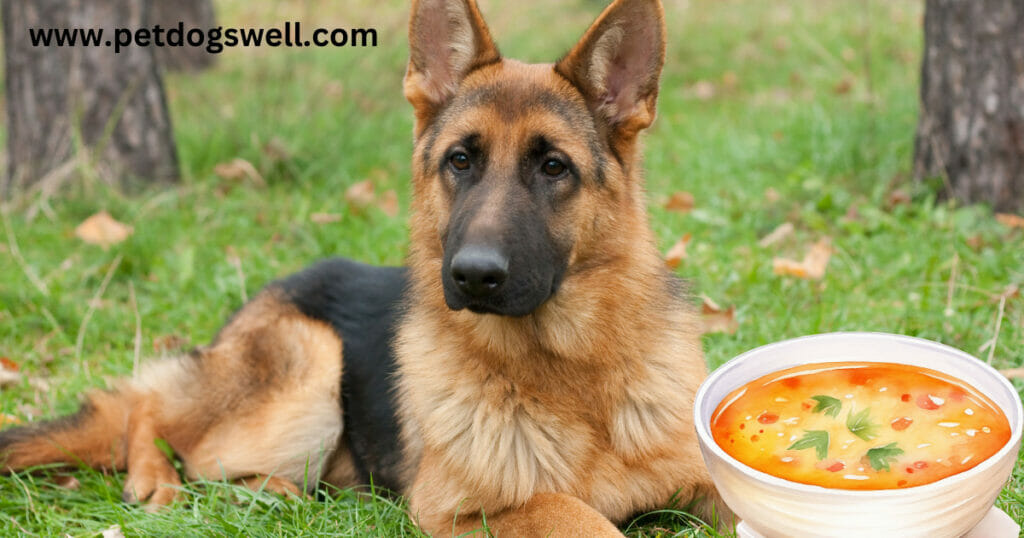
Major Sources of Bone Broth;
Bone broth is a pure soup made from the bones with connective tissues and some meat of animals. The major sources of bone broth are chicken, beef and turkey bone broths which are very healthy and good sources.
Other Foods for German Shepherds with Joint Problems;
Below are other healthy foods that help in the treatment of joint problems.
- High-Quality Lean animal Protein like Chicken, Beef, Turkey and lamb.
- Omega-3 Fatty Acids: These are anti-inflammatory and can help reduce joint inflammation.
- Glucosamine and Chondroitin: These are natural compounds that support joint health by promoting the composition of cartilage and improving joint mobility.
- MSM (Methylsulfonylmethane): MSM is a sulfur compound that can aid in reducing joint inflammation and supports connective tissues.
- Antioxidants: Foods rich in antioxidants, like fruits and vegetables, can help reduce oxidative stress and joint inflammation.
- L-Carnitine: This is an amino acid and it helps maintain a healthy weight, which is important for reducing stress on joints.
NOTE; Make sure to consult with your vet doctor when you see that your German Shepherd dog is suffering from joint problems. He will suggest you the best dog food for German Shepherds and medication according to disease and overall health condition.
Dog Food for German Shepherds with Activity Level and Age
Feeding your German Shepherds healthy and energetic food depends upon the activity level and age of the dogs. The most active and young dogs need more healthy and protein-rich foods as compared to the less active and old age dogs.
Same also growing puppies need more healthy foods to boost their growth. The best food for German Shepherds with higher protein is chicken, eggs, beef, milk, and lamb.
Active and working dogs need more than 1700 and less than 2200 calories every day. German Shepherds are naturally more active dogs, and their activity level decreases as they become older dogs. Therefore, their food requirement also decreases when they become older.
Dry Dog Food vs Wet Dog Food for German Shepherds
Dog foods can be either dry dog food or wet dog food for feeding the dogs. Wet dog food contains lots of moisture, but dry dog food does not contain moisture.
These dry dog food and wet dog food have different textures and also vary in nutritional and moisture content. The animal health book Merck Veterinary Manual (MVM) states, despite these differences dry and wet dog foods provide the same nutrition.
A vet doctor Linda Simon having degrees in DVM, MVB, and MRCVS, who is also a veterinarian at Senior Tail Waggers says, “Most dogs, particularly smaller breeds and picky eaters, prefer wet dog foods.
Vet Dr. Linda Simon says that wet dog food is the very best food for dogs who are suffering from kidney or bladder stones. She adds that wet dog food also has some drawbacks as it spoils quickly when left out and is also a little messier for the dogs.
Dry or Wet Dog Food Which is Best?
Dry dog food and wet dog food each have their own characteristics and effects on your German Shepherd dog’s health.
Dr. Simon says that wet dog food is the best dog food for German Shepherds who are suffering from urinary problems and dehydration. While dry dog food is best for dogs who have dental diseases like overcrowded teeth etc.
IMPORTANT NOTE; Dr. Simon adds that a proper mix of dry and wet dog food is the best food option for your German Shepherd dogs. Because this mixed food provides benefits for both foods and is very beneficial for the good health of your dogs.
Home-Cooked Diets for German Shepherds
Your German Shepherd dog is not only a dog, but also your best friend and security guard. Therefore, you must be careful about his food and all routine necessities.
Some dog owners like to feed their dogs self-made or homemade food as compared to market food. They believe that homemade dog food is more healthy and more energetic than market-purchased food.
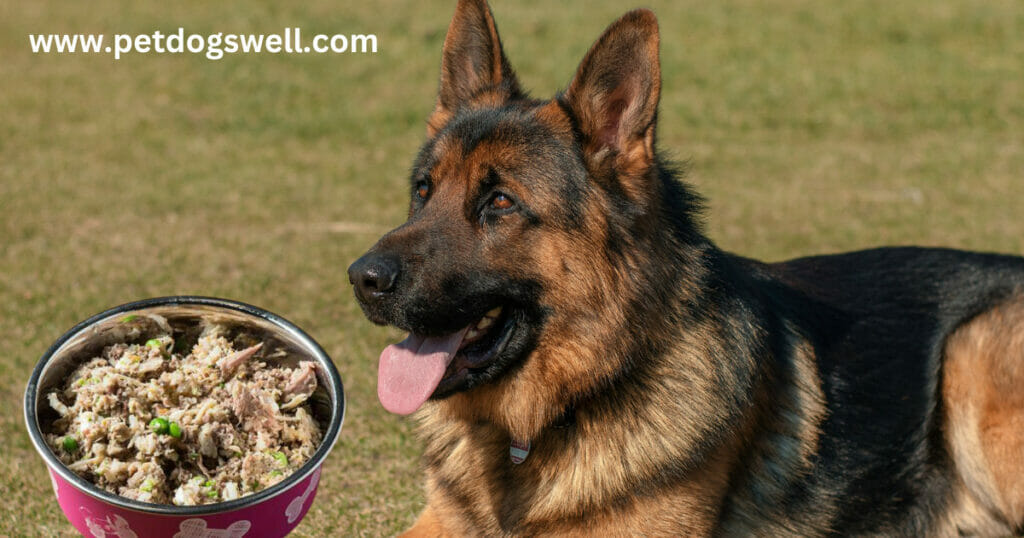
Dog food that is prepared at a commercial scale, is highly processed and low in healthy nutrients. But homemade dog food is the best food for your German Shepherd dogs because it is rich in healthy nutrients.
Homemade Dog Food Examples for German Shepherds
Below are the best homemade dog foods that dog owners can easily make or cook at their homes.
- Chicken and Rice Delight: A simple recipe of boiled chicken, rice, and some vegetables like carrots and peas.
- Beef and Sweet Potato Stew: Combine lean beef, sweet potatoes, and green beans for a hearty stew.
- Turkey and Pumpkin Mix: Ground turkey cooked with pumpkin puree and a touch of brown rice.
- Salmon and Quinoa: Cooked salmon mixed with quinoa and a side of steamed broccoli.
- Egg and Spinach Scramble: Scrambled eggs with spinach, a bit of cheese, and a sprinkle of parsley.
- Peanut Butter and Banana Treats: Homemade dog treats using peanut butter and ripe bananas.
- Liver and Carrot Bake: Liver slices baked with carrots and a dash of olive oil.
- Oatmeal and Blueberry Breakfast: Plain oatmeal topped with fresh blueberries or mixed with a spoonful of yogurt.
- Cottage Cheese and Pea Mash: Cottage cheese mixed with mashed peas for a protein-packed treat.
- Pork and Apple Medley: Lean pork cooked with apples and a bit of brown rice.
What Can German Shepherds Eat?
German Shepherds are big size dogs and they need a large amount of food to carry on their life activities and overall well-being. They need a well-balanced diet containing proteins, carbohydrates and fats etc.
German Shepherd dogs eat a good amount of proteins, carbohydrates, and fats. Additionally, they also like to eat some vegetables and fruits.
There are following proteins, grains, vegetables and fruits that German Shepherds like to eat in their daily diet.
| PROTEINS | GRAINS | VEGETABLES | FRUITS |
| Chicken | Wheat | Broccoli | Banana |
| Eggs | Corn | Beets | Apple |
| Beef | Rice | Bell Peppers | Dates |
| Lamb | Maize | Asparagus | Mango |
| Turkey | Oats | Artichoke | Coconut |
| Duck | Oatmeal | Brussel Sprouts | Cucumber |
| Venison | Quinoa | Cabbage | Orange |
| Fish | Barley | Potatoes (cooked) | Pear |
| Salmon | Buckwheat | Sweet Potato | Pineapple |
| Tuna | Quinoa | Carrots | Blackberries |
| Mackeral | Teff | Eggplant | Blueberries |
| Heart | Rye | Celery & Corn | Strawberries |
| Liver | Amaranth | Lettuce | Raspberries |
| Kidney | Millet | Eggplant | Cranberries |
| Pork | Spelt | Parsnips | Persimmon |
| NUTS | DAIRY | Peas | Peach & Plum |
| Peanuts | Milk | Squash | Olive |
| Almonds | Yogurt | Zucchini | Apricot |
| Cashews | Cheese | Pumpkin | Kiwi Fruit |
| Chestnuts | Cream | Cauliflower | Nectarine |
| Hazelnuts | Ice-cream | Rutabaga | Melon |
| Green Beans | Watermelon |
These are the best dog food for German Shepherds and they provide a lot of energy and dogs also like to eat these different foods.
Conclusion
German Shepherd dogs are big in size and heavy in weight. They are very active dogs and they perform many physical activities like hunting, security guards, and police and army dog services. Therefore, they need more food than other small dog breeds.
Make sure that you should select the best dog food for German Shepherds so that your dogs may eat well and be healthy and active. German Shepherds eat both dry and wet dog foods but be careful about the best quality and well-balanced dog food.
German Shepherds also like homemade dog foods like Chicken and Rice Delight, Turkey and Pumpkin Mix and Salmon and Quinoa. Homemade dog food is more healthy than market foods.
FAQs (Frequently Asked Questions)
1. How often should I feed my German Shepherd?
Daily feeding frequency depends on your dog’s age, activity level, and specific dietary requirements. In general, adult German Shepherds can be fed twice a day, while puppies may require more frequent meals.
2. Can I give my German Shepherd table food scraps?
It’s best to avoid giving your German Shepherd table food scraps, as human food may not meet their nutritional needs and can lead to digestive issues.
3. Are there specific foods to avoid feeding German Shepherds?
Yes, there are some common foods, like chocolates, onions, and grapes are toxic to dogs and should be strictly avoided.
4. How can I know if my German Shepherd has a food allergy?
You should observe signs like itching, excessive licking, or digestive upset. If you suspect a food allergy, consult with a veterinarian for proper testing and dietary recommendations.
5. Can I mix different dog food brands for my German Shepherd?
It’s generally best to stick to one dog food brand to maintain consistency in your dog’s diet. If you plan to switch brands, do so gradually to avoid digestive issues.
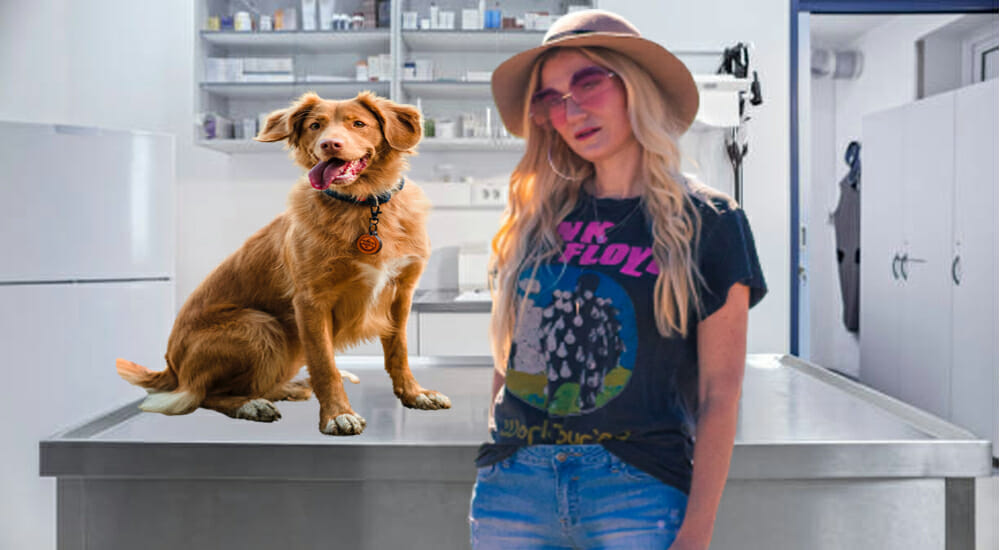
Hello, I am Diana Rose a veterinarian doctor from Greenwich town, 2 Academy Street NY 12834, USA. I have 8 years of experience in treating and caring for dogs. I have proper knowledge about dog health issues, dog general care, dog food, and dog grooming. I received my degree in veterinary medicine in 2014 from Cornell University College of Veterinary Medicine located in the Finger Lakes region, New York, America. I served as a vet doctor at Harlem Animal Hospital New York from 2015 to 2021. I had been dedicated to providing the best possible care for my patients and tried my best to keep them healthy and happy.
